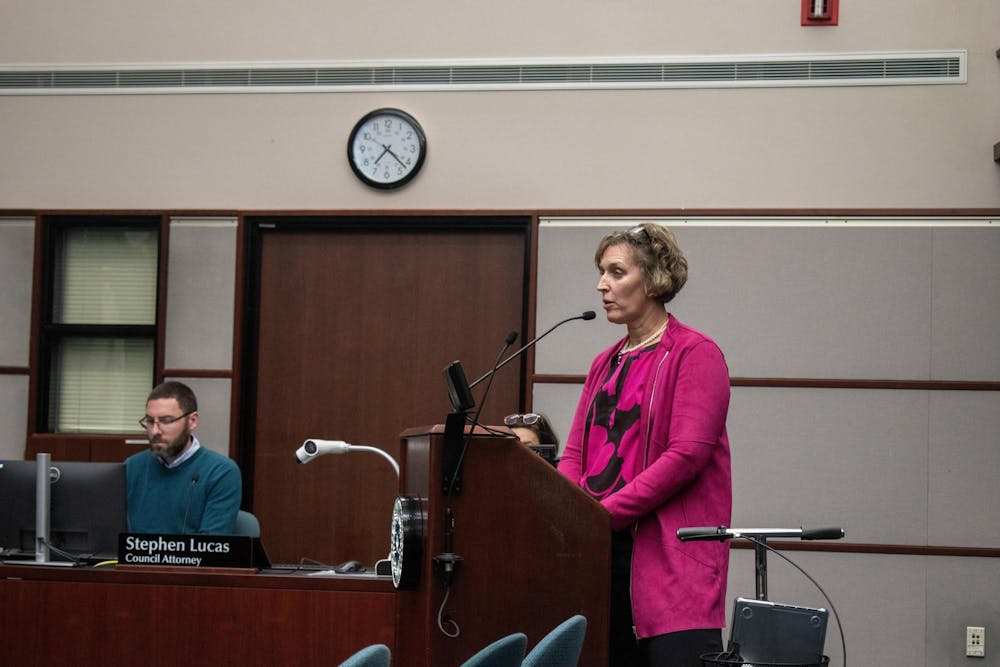The city council last month failed to introduce a pair of resolutions that would’ve started the process to amend Bloomington’s Unified Development Ordinance in front of a crowd of around 30.
The two resolutions collectively called for the city Plan Commission to prepare UDO amendments adding new sustainability incentive requirements for developers, removing minimum parking requirements and allowing for denser housing in residential zoning districts, among other things.
But disagreements behind the scenes in city government mean it’s not certain what’s next for these potential changes.
At the March 12 meeting, councilmember Kate Rosenbarger, who sponsored one of the resolutions, told the Indiana Daily Student the resolutions could come back up at a future meeting with a full council. They haven’t yet, and councilmember Matt Flaherty said he wants more clarity from Bloomington Mayor Kerry Thomson on what she wants to see next.
"Goes both directions”
Before the council could discuss the resolutions March 12, councilmembers had to vote to introduce them — typically a procedural move. Both introductions failed 4-4, in the absence of councilmember Sydney Zulich, who said she was out sick. A vote to establish different meeting rules, including specific time limits on responses and comments, failed too.
Matt Flaherty, the councilmember who sponsored one of the resolutions, said he doesn’t think he’s ever seen agenda items fail to be introduced in his five years of council service. He called the move to prevent the legislation from being read “unbecoming of the office,” particularly without notice in advance.
“It’s not something we should be in the habit of doing,” Flaherty said. “We should want to hear ideas, especially when they’re dealing with challenging topics that our community is facing like housing scarcity and housing unaffordability and the climate crisis.”
Councilmember Isak Nti Asare voted against introducing the resolutions and rules of debate. He said there is nothing stopping councilmembers from re-introducing the resolutions later, and those who voted in favor of introduction could’ve asked during the meeting why those who voted against it did so.
“It kind of goes both directions, that if the councilman is upset about people engaging with them, then they also should be engaging with the people that they want to get their votes,” Asare said.
“We’ve done it already”
The council members who voted against introducing the resolutions expressed different reasons for their votes, but many came down to time. Multiple councilmembers and Thomson said publicly they learned about the resolutions when the public did: the Friday before the meeting, when agendas are released.
Rosenbarger, who sponsored the second resolution, said two other UDO amendment resolutions in November appeared on the agenda the same amount of time before getting council approval.
“We’ve done it already,” Rosenbarger said.
The March 12 meeting had also been scheduled as a deliberation session, meaning no votes on resolutions. However, council president Hopi Stosberg said she wanted to allow the vote because there were multiple other UDO changes in progress.
Asare said that change to allow the vote led to a false public perception that the council was attempting to skirt public comment on the changes.
“We had a very simple way that was, you know, available to us, which was just discuss it in the deliberation session,” Asare said.
Thomson said passing “broad sweeping” resolutions without public input wasn’t an ideal process for the city.
Flaherty, though, said the legislative process would be a viable tool to get feedback from the public. Stosberg noted at the March meeting that, if the resolutions passed, there would have been at least three more public meetings with public comments before the changes became official. Flaherty also said that wouldn’t preclude other types of public engagement sessions.
"Existing city policy”
While other council members and the mayor said they’d only seen the resolutions days before the meeting, Flaherty and Rosenbarger argue they’ve had over a year of city staff collaboration. In a March 14 email to Thomson copying over 20 city staff and councilmember email addresses, Flaherty shared a timeline of events relating to the resolutions.
He wrote that he first emailed Thomson, Deputy Mayor Gretchen Knapp and Jackie Scanlon, then- director of the planning and transportation department, in March 2024 about changes that would become one of the two resolutions. He continued conversing with city staff throughout the year, he wrote.
Then, on Feb. 19, Stosberg tentatively set the two resolutions for March 12 on the internal council schedule, according to Flaherty.
Flaherty said the resolutions would start to implement existing city policy. The Climate Action Plan, passed by the council in 2021, included strategies related to the contents of Flaherty and Rosenbarger’s resolutions.
“I think a little bit of that is missed, that these were resolutions to take the next step in implementing existing city policy because the mayor is not taking those steps herself,” Flaherty said.
Thomson, though, said while she knew what concepts Flaherty wanted, she didn’t know the resolutions were being developed. She also said she believes any broad changes to the UDO should tie in well with the city’s permitting process and not complicate housing development.
“I think we have a lot of shared goals in terms of the outcomes, and we just have a difference of opinion in how we get there,” Thomson said.
She believes these UDO amendment processes addressing the Climate Action Plan should stem from the administration, particularly the housing and planning departments. Thomson said she is taking course work with those department directors to develop a plan for amending the UDO. Thomson is part of the 2025 Mayors’ Institute on City Design Just City Mayoral Fellowship, which features instruction on planning and design.
The plan Thomson and her staff develops will be available by the end of April, she said, with public input to follow.




